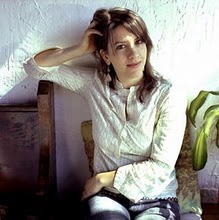Anders Dunker: Rediscovering Earth
May 18, 2021 by David
Filed under Non-Fiction, WritersCast
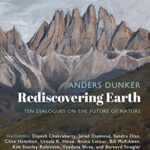 Rediscovering Earth: Ten Dialogues on the Future of Nature – conversations with Anders Dunker – OR Books – 9781682195086 – Paperback – 240 pages – $23 – ebook versions available at lower prices
Rediscovering Earth: Ten Dialogues on the Future of Nature – conversations with Anders Dunker – OR Books – 9781682195086 – Paperback – 240 pages – $23 – ebook versions available at lower prices
Thinking about how to think about climate, earth, humans on it, and the future, are major challenges for all of us who care about the future of our planet. It may be that most of us alternate between despair and rage, and even with an optimist’s outlook, we have trouble dealing with the sheer scope of what is happening to our surroundings (I think using the words “environment” and “earth” and “planet” has now become counterproductive).
I am constantly searching for writing, whether it is in books, online or in magazines, that will offer me constructive perspectives, different and hopefully better conceptual frameworks than those we have developed, toward making it possible to be both continually engaged and continually energized. I don’t usually feel I can do that on my own.
Anders Dunker’s collection of conversations with some of the deeper thinkers about the future and us in it, turns out to be very useful. The diverse viewpoints, the language of thoughtfulness and care, the commitment to inquiry, are all inspiring elements of this short book. And with such a diverse set of outlooks, it is possible to not lose sight of the core reason for this book to exist – to inspire hope.
Dunkers poses this question: “if we know that we are destroying the planet, our habitat, why do we continue to do it?” His dialogues attempt to investigate this question, and thereby come to some sense of how we might go forward, not ourselves alone, but the nature that we rely on, together.
This is the challenge we face right now. The challenge will be different in a few years, the unfolding story will force a reckoning. For now, those who read the stories in Rediscovering Earth will be able to come to a better sense of what we can and must do together in this moment.
Dunkers proposes that our future, nature itself, will be based on how we navigate the realm of culture, including philosophy, art and literature, the groundwork of our being, as much as or more than in scientific and technological matters. In order to act, we must redefine ourselves, become truly planetary citizens, and recognize how we are all connected, and then act upon, from that, understanding.
We had a terrific conversation, not only about the book and the contributors to it, but about how we will uncover the future and live in it together. A very hopeful experience. I came away from our talk fully energized, and feeling stronger.
Anders Dunker bio (from his website): Born in Norway, raised in the countryside in a family much dedicated to wildlife and nature. Educated in humanistic subjects and Cultural History at the University of Oslo, with Philosophy, Comparative Religion and Comparative Literature as main subjects. Teacher of Aesthetics and other subjects at the University of Oslo, Philosophy and Cultural History in Rome and Barcelona.
Senior lecturer at Kulturakademiet (Norwegian private college) for 10 years, now writer for acclaimed Norwegian & international newspapers and magazines (Le Monde diplomatique, LA Review of Books, NyTid, Vagant, Samtiden, Modern Times Review, Agora). Board member of the Norwegian Writers’ Climate Campaign,
Series Editor of Futurum Collection at Existenz Publisher (Norway) and Editorial Board Member at Technophany, a journal for Philosophy and Technology.
His current book projects include an essay on the future as seen from California and a volume on Peter Sloterdijk’s philosophy. Anders currently lives with his wife, an environmentalist and animalist singer, in Los Angeles, California. He is also a plein air painter.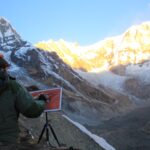

From Dialogue One: “The Rediscovery of the Earth—with Bruno Latour”
Anders Dunker (AD): Historically, the age of discovery is over. Are we none the less in a new age—an age of rediscovery—that can lift our spirits and propel us past the nagging feelings of tragedy?
Bruno Latour (BL): Well, it is my way of being optimistic. It is my way of not taking part in the sense of doom. Scientifically and technically, it is perfectly rational to be a pessimist, but I don’t think it makes much sense politically. Optimism has nothing to do with technoscience—DNA plus cognitive science plus robots plus outer space. Instead it is connected with exploring the world we thought we knew. I will borrow the term from you and call our time period an age of rediscovery, even if it is grandiose. What we call local has quite a different meaning in relation to Gaia than it previously had. It now has many different dimensions. The rediscovery of a place is in some ways a cliché—since ecologists have been talking about the same thing for years—but this concept also leads to a different way of framing the world, it leads to another geometry, so to speak. Water gets another meaning. Ice gets another meaning. Industry is considered in relation to the amount of CO₂ in the atmosphere. We see things in new ways. Antibiotics have a different kind of globalization than weeds, for example.
AD: Traditionally, the concept of the local has had a flavor of subjectivity—existence circumscribed by the immediate horizon—in contrast to the scientific gaze, which purports to see everything as if from outer space?
BL: And here lies the error. The local is objective. The gaze from inside the critical zone is completely objective, it is just objective in a different way. What we see is real, but this reality only becomes visible if we learn what different parties are up to, what they need, what they want, what they can accomplish.
Buy the book directly from the publisher, OR Books.
Podcast: Play in new window | Download
Ben Goldfarb: Eager: The Surprising, Secret Life of Beavers, and Why They Matter
November 6, 2018 by David
Filed under Non-Fiction, WritersCast
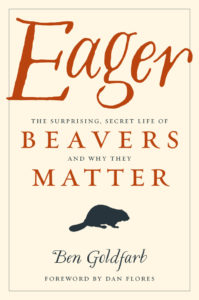 Eager: The Surprising, Secret Life of Beavers, and Why They Matter – Ben Goldfarb – Chelsea Green – 304 pages – Hardcover – 9781603587396 – $24.95 – July 5, 2018 – ebook editions available at lower prices
Eager: The Surprising, Secret Life of Beavers, and Why They Matter – Ben Goldfarb – Chelsea Green – 304 pages – Hardcover – 9781603587396 – $24.95 – July 5, 2018 – ebook editions available at lower prices
This amazing book completely captivated me from beginning to end. Environmental journalist Ben Goldfarb, a Yale Forestry School graduate, is a natural storyteller, and writes with a warm and inviting style. In Eager, he demonstrates how the actions of a single mammal species so thoroughly affects the ecology of rivers and landscapes we have come to take for granted, without understanding the effects of these amazing and inventive rodent environmental engineers.
Beavers have had wide-ranging effects on the landscape for aeons. When Europeans arrived in North America, beavers were everywhere, and the very nature of rivers was completely different than they appear to us today. Slowed in flow, and wildly marshy, because of all the beaver dam building, rivers were rich and varied environments for many species of wildlife, insects and plants.
And yes, beavers are rodents – but very special and important to us all. They were trapped and hunted for their fur in the 18th and 19th centuries. That demand created a hunting and trapping economy that caused beavers to be virtually obliterated from most parts of the United States. And their disappearance literally changed our landscape, allowing the open flow of rivers, thereby causing erosion and the loss of healthy habitat over many years. The river landscapes most of us have seen in our lifetimes simply did not exist 400 years ago.
Beavers have not been appreciated, much less loved, by farmers and ranchers in North America, and typically not understood or appreciated by most of us. But now, in a time of climate change, increasing heat, more drought, and lacking the money or will to build yet more infrastructure, beavers may represent a viable alternative to restoring the health of many river systems around the country.
Ben Goldfarb’s wide ranging and witty book teaches us a great deal about beavers, personalizes their appeal, and shows us why so many people are enthusiastic about beavers now, yet he also shows how difficult it is to change the way we think about beavers and what they can do to make our world a better place. I hope this book adds more than a few beaver enthusiasts to the world, and helps change the way we co-exist with beavers in the future.
It’s impossible to read this book and not come away with a changed perspective. And I really enjoyed speaking with Ben about the book and about his experiences with beavers around the world. Overall, this book is great fun, and I am happy to recommend Eager to readers of all interests.
“Eager takes us inside the amazing world of nature’s premier construction engineer…and shows us why the restoration of an animal almost driven to extinction is producing wide-ranging, positive effects on our landscapes, ecology, and even our economy.”―National Geographic
“This witty, engrossing book will be a classic from the day it is published.” –Bill McKibben, author of The End of Nature
Ben Goldfarb is an environmental journalist and also a writer of fiction. His writing has been published in Science, Mother Jones, The Guardian, High Country News, Audubon Magazine, Modern Farmer, Orion, Scientific American, and many other magazines and journals. He has a masters degree from the Yale School of Forestry and Environmental Studies, and was a 2018 North American Congress for Conservation Biology journalist fellow. You can learn more about his work at his website here.
If you are interested in learning more about beavers or becoming a beaver supporter, there are many organizations around the country. The Beaver Institute is a good one to start with.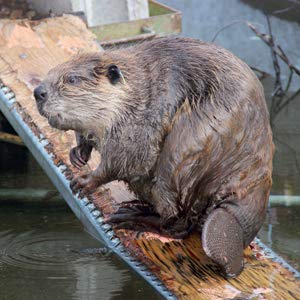
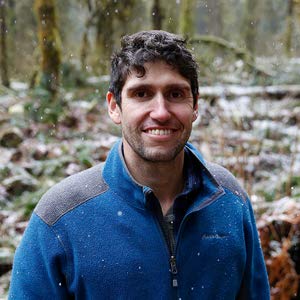
Podcast: Play in new window | Download
Elizabeth Hand: Fire
May 11, 2017 by David
Filed under Fiction, WritersCast
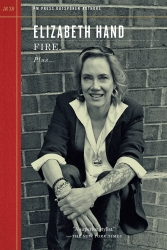 Fire (Outspoken Authors Series) – Elizabeth Hand – PM Press – paperback – 978-1-629632-34-6 – 128 pages – paperback – $12.98 (ebook version available at $9.99)
Fire (Outspoken Authors Series) – Elizabeth Hand – PM Press – paperback – 978-1-629632-34-6 – 128 pages – paperback – $12.98 (ebook version available at $9.99)
Over the years, I had heard of Elizabeth Hand, and knew she was a writer to be reckoned with, but I had never read her science fiction and mystery novels or stories. She was just not on my radar. Now, having read this fantastic short collection of some of her fiction and nonfiction, I have belatedly begun to understand the scope of her work and enjoyed the opportunity to experience her powerful writing.
Fire is a short book that packs a big punch. Maybe it is the ideal introduction to Hand’s work, and maybe that was PM Press’ intention in publishing it. The title story was written especially for this book. It is a powerful post-apocalyptic short story set in a world – our own – approaching global conflagration.
In a useful essay, “The Woman Men Couldn’t See,” Hand examines the work and life of Alice Sheldon, who wrote some stunning science fiction novels under the pseudonym “James Tiptree, Jr.” in order to conceal identity from both readers and her bosses at the CIA. In another nonfiction contribution called “Beyond Belief,” Hand talks about how she went from being a troubled teenager to a serious writer. Other pieces include some of her short fiction, a bibliography of her writing, and PM’s own interview with the author (which I tried to not replicate in my own conversation with Elizabeth).
After seeing Patti Smith perform, Hand became involved in the nascent punk scenes in DC and New York. She worked at the Smithsonian’s National Air and Space Museum in Washington, D.C. Hand is the author of a number of novels and three collections of stories and her work has been recognized by the Nebula, World Fantasy, Mythopoeic, Tiptree, and International Horror Guild Awards. Her novels have been chosen as notable books by both the New York Times and the Washington Post. Hand is a regular contributor to the Washington Post Book World and the Magazine of Fantasy and Science Fiction, and lives with her family on the coast of Maine.
Talking to Elizabeth Hand was great fun for me. She is as good a conversationalist as she is a writer, and has alot to say that I think listeners will find interesting. I hope this interview with Elizabeth Hand will be a useful and meaningful contribution to our literary landscape. Now that I have become familiar with her work I intend to add Elizabeth Hand’s fiction to my ever expanding list of “must-read” books. Thanks to PM Press for introducing me to this wonderful writer’s work.
Podcast: Play in new window | Download
Courtney White: Two Percent Solutions for the Planet
October 22, 2015 by David
Filed under Non-Fiction, WritersCast
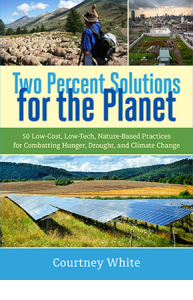 Two Percent Solutions for the Planet: 50 Low-Cost, Low-Tech, Nature-Based Practices for Combatting Hunger, Drought, and Climate Change – 9781603586177 – Chelsea Green Publishing – 240 pages – paperback – $24.95 – October 2015 (ebook versions available at lower prices)
Two Percent Solutions for the Planet: 50 Low-Cost, Low-Tech, Nature-Based Practices for Combatting Hunger, Drought, and Climate Change – 9781603586177 – Chelsea Green Publishing – 240 pages – paperback – $24.95 – October 2015 (ebook versions available at lower prices)
It’s my belief that climate change and its consequences are the single most important issue of our time. I am almost continuously upset by the responses of our society to environmental and planetary matters, which usually range from denial to despair.
Part of the problem is simply its scope. Solving planetary scale problems is simply beyond the ability of most of us to comprehend, much less to try to accomplish anything meaningful for us.
When I ran across this book, published by my friends at Chelsea Green Publishing in Vermont, I knew it would be a book I would like. And having read it, I continue to be inspired by its simple practicality. I’ve learned a lot from author Courtney White and can recommend this book to all, regardless of whether you are actually in a position to apply any of the ideas here. Even if you are a couch potato or a city dweller, this book will help you understand what is possible and practical for us to do in order to make a meaningful change in how we live on this earth.
I lifted the following paragraph from Courtney’s website, A West That Works, because it best explains what this project is all about, and places it meaningfully in context.
We live in what sustainability pioneer Wes Jackson calls “the most important moment in human history,” meaning we live at a decisive moment of action. The various challenges confronting us are like a bright warning light shining in the dashboard of a speeding vehicle calledCivilization, accompanied by an insistent and annoying buzzing sound, requiring immediate attention.
I call this moment the Age of Consequences – a time when the worrying consequences of our hard partying over the past sixty years have begun to bite hard, raising difficult and anguished questions.
How do you explain to your children, for example, what we’ve done to the planet – to their planet? How do you explain to them not only our actions but our inaction as well? It’s not enough simply to say that adults behave in complex, confusing, and often contradictory ways because children today can see the warning light in Civilization’s dashboard for themselves. When they point, what do we say?
As a parent and as a writer, this anguished question created a strong desire to document the sequence of events that I was witnessing as well as attempt to explain our behavior as a society. Hopefully, we would manage to turn off the warning light in the dashboard, but if we did not I was certain that future generations would want an accounting of our behavior.
So, in 2008 I began to write, blending headlines, narrative with travel and research into chronological installments, crossing my fingers.
I think he has done an admirable piece of work toward giving us a better future. Our conversation should add to an understanding of what is possible. Do go buy this book!
A former archaeologist and Sierra Club activist, Courtney dropped out of the ‘conflict industry’ in 1997 to co-found The Quivira Coalition, a nonprofit dedicated to building bridges between ranchers, conservationists, public land managers, scientists and others around the idea of land health. Today, his work concentrates on building economic and ecological resilience on working landscapes, with a special emphasis on carbon ranching and the new agrarian movement. His writing has appeared in numerous publications, including Farming, Acres Magazine, Rangelands, and the Natural Resources Journal. His essay The Working Wilderness: a Call for a Land Health Movement was included by Wendell Berry in 2005 in his collection of essays titled The Way of Ignorance. Island Press published Courtney’s book Revolution on the Range: the Rise of a New Ranch in the American West and Courtney co-edited, with Dr. Rick Knight, Conservation for a New Generation, also published by Island Press. He lives in Santa Fe, New Mexico, with his family and a backyard full of chickens.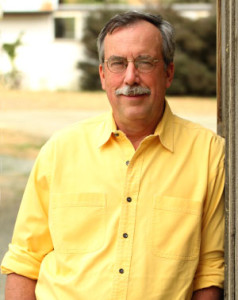
Podcast: Play in new window | Download
David Gessner: My Green Manifesto: Down the Charles River in Pursuit of a New Environmentalism
December 3, 2011 by David
Filed under Non-Fiction, WritersCast
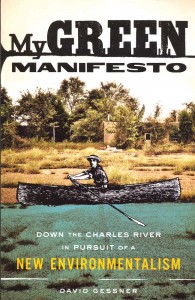 978-1-571313-24-9 – Milkweed Editions – paperback – $15 (ebook editions available)
978-1-571313-24-9 – Milkweed Editions – paperback – $15 (ebook editions available)
David Gessner is a sort of post-modernist environmentalist. He’s written a number of books that celebrate the natural world and the wild, and he is a terrific writer capable of transcendent prose and has the keen observer’s eye that anyone writing about nature must have. But he understands the difficulties and contradictions that suffuse contemporary civilization. And he has a sense of humor and irony (which environmentalists are not always known for).
In My Green Manifesto, he addresses a major issue that affects so many of us who feel strongly about the arc of modern civilization, that its inertia is overwhelming, the problems so great, the solutions so elusive, and the efforts of individuals so ineffectual as to make us lose all hope of being able to make meaningful change.
The book takes us through Gessner’s journey from the headwaters of the Charles River to its end in Boston’s urban harbor. His trip is made for the most part in company with a true environmental hero, Dan Driscoll, who almost single-handedly spurred the suburban and urban communities along the once highly polluted river to make significant changes to both restore and protect the river and riverside ecology. They travel in a leaky canoe, drink beer, sleep in tents, and enjoy the pleasures of a “limited-wild” experience.
Gessner takes heart from the work Driscoll has done, and shows us how important his practical efforts have been. “This new picture is that of a man or woman who knows how to get things done, who understands the value of momentum, of focus on a particular project. Not a shrill or dry or particularly flowery environmentalism … Someone willing to get in [a] fight and ‘Sue the bastards.’ Someone willing to stick their nose in there and feel what it’s like to get bruised. And someone willing to stay locked in that fight for years, even if it costs them emotional as well as actual capital.’’
Gessner writes with great humor and joy about the pleasures of being in nature, wherever one lives, and that is the core of his manifesto. His ideas will resonate for many who are not willing, able or equipped to spend significant time in distant wildernesses. And as a “manifesto” this book will be easy for most readers to digest and accept. Gessner’s message is positive and powerful because it is realistic and not preachy and because so many of us can relate to his experiences of the joy of being in nature and at the same time despair over the sheer extent of modern society’s environmental unconsciousness.
Gessner reminds us that it is possible to hold two seemingly contradictory ideas in our minds at the same time, that complexity and contradiction are almost facts of life, but cannot defeat us from taking action to make change. “The first idea was acceptance, the acceptance, totally without rancor, of life as it is, and men as they are … But this did not mean that one could be complacent, for the second idea was of equal power: that one must never, in one’s own life, accept these injustices as commonplace but must fight them with all one’s strength.’’
Author website here (you can find a list of all his many fine books there) Gessner’s latest book is one I am interested in reading as well. The Tarball Chronicles: A Journey Beyond the Oiled Pelican and Into the Heart of the Gulf Oil Spill chronicles his visit to the Gulf after it had passed out of the news. Not an uplifting story, I fear.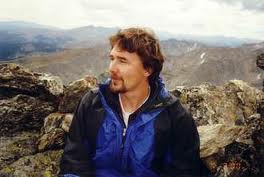
Podcast: Play in new window | Download
Anna Lappe: Diet for a Hot Planet
July 2, 2011 by David
Filed under Non-Fiction, WritersCast
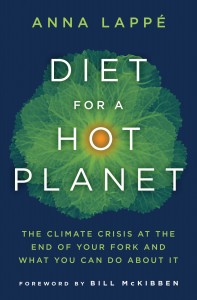 978-1-60819-465-0 – Bloomsbury – Paperback – $15.00 (ebook editions available)
978-1-60819-465-0 – Bloomsbury – Paperback – $15.00 (ebook editions available)
Anna Lappe´ is the daughter of the well-known activist and writer Frances Moore Lappe´, author of the classic Diet for a Small Planet, a book that introduced Americans to the idea of thinking about food and its role in ecology and the world economy, and how food is so deeply intertwined with economics and politics. Anna has therefore been involved in food issues since she was a child. She and her mother collaborated on another interesting and challenging book, Hope’s Edge in 2002. So it’s not a surprise that she is so thoroughly cogent and coherent writing and talking about food issues in the context of climate change.
As Anna says on one of her many website, takeabite.cc, “the food system is responsible for as much as one-third of all greenhouse gas emissions. These emissions are particularly alarming because the food sector is the biggest driver behind methane and nitrous oxide emissions, which have global warming effects many times more powerful than carbon dioxide.” In Diet for a Hot Planet, Lappe´ goes straight to the heart of the issue: if we are going to think about the global climate crisis, we have to think about our food system, and if we are going to make change to mitigate the effects of climate change, we must make changes (now) in the global industrialized food system that dominates most of the world today.
This book was extensively and deeply researched; Lappe´ talked to many scientists, went to UN, governmental, corporate, and grassroots agriculture conferences, worked her way through many lengthy and dense reports and studies, and also visited organic farms around the world.
In this book she has put together an impressive array of facts proving that global industrial agriculture—specifically the use of hazardous chemicals, concentrated animal feeding operations, biotech crops, and processed foods—is impoverishing the land, destroying rain forests, polluting waterways, and emitting nearly a third of the greenhouse gases that are heating the planet.
By contrast, intelligently designed and operated organic-farming methods reduce carbon emissions and toxic waste while at the same time nurture soil and biodiversity. Lappe´is convinced (and will likely convince you) that eating according to ecologically appropriate principles can not only influence the marketplace and help combat world hunger and climate change, but will make us healthier and safer as well. Lappé also decodes food labeling, exposes Big Ag’s “greenwashing” tactics, and offers “seven principles of a climate-friendly diet.”
With a terrific foreword by the brilliant Bill McKibben, Diet for a Hot Planet should be essential reading for anyone who is trying to grapple with making real change in the way we live on this fragile planet. Anna is a terrific public speaker and our talk for WritersCast is lively, full of information, and optimistic and positive as Anna herself.
Anna Lappe´related organizations and websites should be on your bookmark list:
Take a Bite Out of Climate Change
Podcast: Play in new window | Download
Derrick Jensen: Lives Less Valuable
April 4, 2010 by David
Filed under Fiction, WritersCast
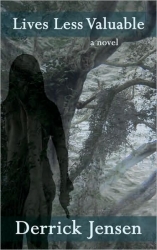 978-1-60486-045-0 – paperback – Flashpoint Press/PM Press – $18.00
978-1-60486-045-0 – paperback – Flashpoint Press/PM Press – $18.00
Derrick Jensen is one of the most intelligent nonfiction writers around. His intellectual ability, brilliant writing and passionate voice for nature, for the powerless (not just people, but our fellow plant and animal species), and for the wounded, have made him a hero for many who oppose the structures of modern society. I was not familiar with his fiction before reading Lives Less Valuable. It’s very difficult to write fiction with a political message, but Jensen succeeds here. Even though the reader knows there is a political subtext, the story and the characters work well, they’re both believable and instructive.
The story centers on Malia, an environmental activist in a modern city where people are dying from a toxic river. The corporation that is at the root of the problem does everything possible to maximize its profits and does not care about the environmental cost borne by the poor people of the city. She is drawn into a complex web of events that forces her to make choices about her beliefs and what she must do to make meaningful change, and when she does, the effects of her choices resonate through the lives of many others. And they do make a difference.
Talking to Derrick Jensen was a great experience for me. He has so much to say about human beings, our relationship to nature, and the meaning of political action, not to mention writing and story telling. In this interview he talked about many subjects, including the nature of activism, the difference between writing fiction and nonfiction, and the details of the writing of this book. He’s as eloquent and brilliant a speaker as he is a writer. Derrick Jensen truly is one of our great public intellectuals. Please note that this interview is longer than usual at 32 minutes, but should reward the listener with a worthwhile experience.
Podcast: Play in new window | Download
David M. Carroll: Following the Water
February 7, 2010 by David
Filed under Non-Fiction
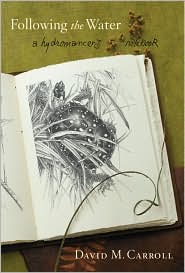 978-0547069647 – Hardcover – Harcourt Houghton Mifflin – $24.00
978-0547069647 – Hardcover – Harcourt Houghton Mifflin – $24.00
David M. Carroll has been “following the water” for almost his entire life. He grew up in Connecticut, then lived in Massachusetts, and moved to New Hampshire to find places less disturbed by humans, where he could study turtles and their woodland, waterine habitats. Which he has done now for many years. Following the Water is subtitled “A Hydromancer’s Notebook; a hydromancer would be one who divines by the motions or appearance of water, which is certainly descriptive of what David Carroll does in his life and in this book, a poetic journal of a year of divining the natural world by close observation of it.
Most of us spend far too little time in nature, and many of those who do “use” the natural world for entertainment or work in a way that would be difficult to distinguish from how they treat the non-natural world. What is so beautiful about Carroll’s work and his writing about it, is the depth of his observation, and his literal being in place. Reading his elegiac descriptions of the watery environments of New England transported me to an almost metaphysical trance-like state of mind where I could imagine myself inhabiting the outside space in which he spends so much of his time.
Of course there is a terrible sadness in this book, as Carroll experiences the changes in the places he has known so well and so long, always brought on by the effects of constantly encroaching human development. He knows the turtles and their environments will soon be threatened and knows there is almost nothing that can be done to protect them. This is a feeling that many who work in and strive to protect our remaining wild places share, an ever present sense of desperation, as we near the tipping point of urban and suburbanization.
Carroll writes beautifully, and his drawings are exquisite. Reading this book made me wonder how I had managed to miss reading his earlier books, and has spurred me to go out and get them all. Here’s a perfect example of the quiet power of his prose:
“As daylight diminishes, the peep-frog chorus intensifies in the backwaters of a fen a quarter mile away. With raucous clamor and a rushing wind of wings beats a flurry of grackles lifts off from the topmost canopy of the red maple swamp. In the quieting that follows, I hear again the drift of evensong from their red-winged cousins on the far side of the wetland mosaic. The season, like the water glimmering all around, extends before me.”
David Carroll is as enjoyable to hear talking as his writing is to read. Interviewing him was a pleasure, tinged with a shared sense of dismay about what has happened to our shared New England natural environment. Both this book and this talk are among my favorites, and I hope listeners will agree.
Podcast: Play in new window | Download
James Gustav Speth: The Bridge at the Edge of the World: Capitalism, the Environment, and Crossing from Crisis to Sustainability
August 30, 2009 by David
Filed under Non-Fiction
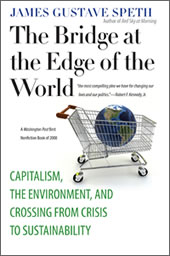 978-0300151152 – paperback – Yale University Press – $18.00
978-0300151152 – paperback – Yale University Press – $18.00
While I was reading The Bridge at the Edge of the World, I often would exclaim out loud as so many of the ideas the author talks about are ones I believe in and feel are important to the dialog about the future of our planet. This is an important book that should be widely read, discussed and used as the basis of action – and soon!
Co-founder of the NRDC, former Yale University dean, and former White House advisor James Gustave Speth has been a leader in the environmental movement for more than 30 years.
Now, faced with overwhelming evidence of galloping degradation of the planet, Speth has concluded that the environmental project—his project—has failed. No matter how hard environmentalists work, the current of destruction against which they are swimming is simply too swift. In order to preserve a livable planet for future generations, Speth argues in The Bridge at the Edge of the World that the current itself must be altered. And the current is that untouchable edifice, American-style consumer capitalism.
I found this book to be powerful and compelling and wanted to talk to “Gus” Speth about the implications of his thinking. How should we go forward when we know that the way we live today is putting us on a collision course with the natural world? How do we build new ways of living that are sustainable? And how are we going to do this in the face of so many entrenched interests that will oppose the essential changes we feel are necessary for human survival and for the preservation natural systems in a viable planet earth?
While this interview is perhaps all too brief, Speth talks in depth about some of his ideas and answers my questions with his typical incisiveness and intelligence.
Podcast: Play in new window | Download

